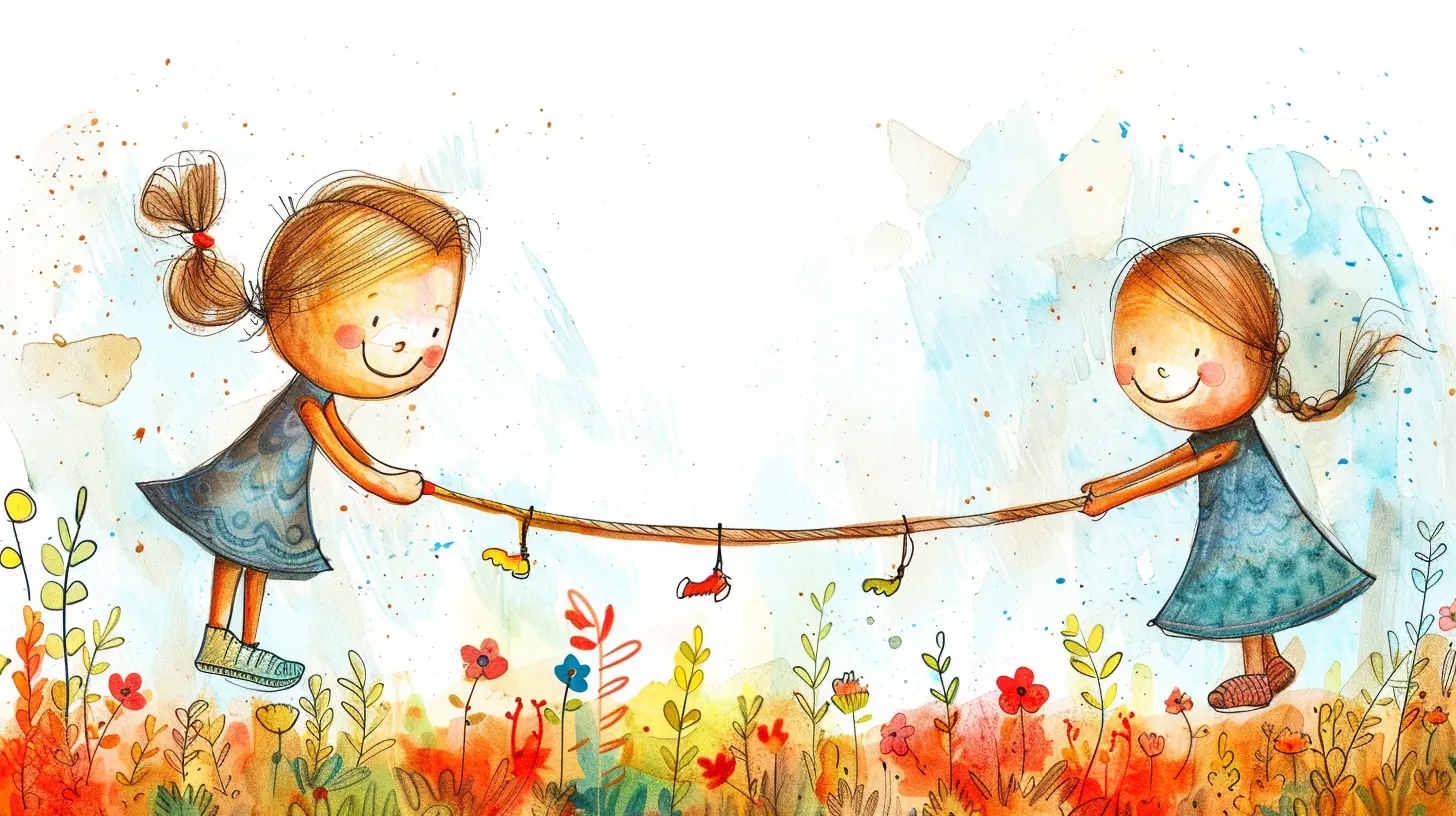Encouraging Teamwork with Sibling Cooperation
27 April 2025
Sibling relationships can be a mix of love, laughter, and the occasional squabble. While it's natural for brothers and sisters to argue from time to time, fostering teamwork and cooperation between them can build a strong foundation for lifelong relationships. If you’re tired of constant bickering or simply want to enhance their bond, this guide will help you encourage a spirit of teamwork among siblings. 
Why Sibling Cooperation Matters
Encouraging teamwork between siblings isn’t just about reducing conflict—it teaches vital life skills. Children who learn to work together with their siblings develop better communication, empathy, and problem-solving skills. These lessons extend beyond childhood, helping them navigate friendships, school projects, and even future workplace dynamics.When kids cooperate, they also form a stronger emotional bond. Instead of seeing each other as rivals, they become allies, always having a built-in support system. That’s something money can’t buy! 
Understanding Sibling Dynamics
Before we dive into strategies, it’s important to recognize that every sibling relationship is unique. Factors like age gaps, personality differences, and birth order all play a role in how children interact.- Older siblings may feel responsible or even frustrated when younger ones don’t listen.
- Younger siblings might crave attention or struggle to keep up with their older counterparts.
- Middle children often find themselves stuck between being a leader and trying to fit in.
Acknowledging these dynamics helps us create fair and effective ways to promote teamwork. 
Practical Ways to Foster Sibling Teamwork
1. Create Shared Goals
One of the best ways to encourage teamwork is to give siblings a common goal. This could be something as simple as building a LEGO castle together or planning a small family event. Give them tasks that require collaboration and allow them to celebrate their success as a team.Example: Challenge them to clean up their playroom as a team and reward them with a fun movie night once it’s spotless.
2. Encourage Positive Communication
Disagreements between siblings are inevitable, but it's how they handle conflict that matters. Teach them to express their feelings without yelling or blaming each other. Encourage phrases like:- “I feel upset when you take my toy without asking.”
- “Can we take turns instead of fighting over it?”
Modeling respectful communication yourself will also go a long way in guiding them.
3. Assign Team-Based Chores
Chores are a great way to promote responsibility, but they also serve as a teamwork lesson. Instead of giving each child separate tasks, assign chores they must complete together.Examples:
- One child washes the dishes, the other dries them.
- One organizes the bookshelf, while the other dusts it.
This not only strengthens their bond but also teaches them to divide responsibilities fairly.
4. Praise Team Efforts Over Individual Wins
While it’s good to acknowledge individual achievements, praising teamwork is even more powerful. Instead of saying, “Great job, Sam, for doing your homework,” try:"I love how you both helped each other finish your homework today—well done as a team!"
By doing this, you reinforce collaboration over competition.
5. Make Family Activities Team-Oriented
If family game nights consist of constant rivalry, switch things up with cooperative games instead of competitive ones. Board games like Pandemic or Forbidden Island require players to work together towards a common goal rather than competing against each other.You can also try outdoor activities that promote teamwork, such as:
- Building an obstacle course together
- A treasure hunt where they must cooperate to find clues
- Cooking a meal where each child has a role
6. Teach Conflict Resolution Skills
Let's be real—siblings will argue. Instead of stepping in immediately, guide them through resolving conflicts on their own. One method is the "Stop, Talk, Solve" approach:1. Stop – Take a deep breath and calm down before responding.
2. Talk – Each person gets a turn to express how they feel.
3. Solve – Work together to come up with a fair solution.
This method helps children learn that conflict doesn’t have to end in frustration—it can be a stepping stone to understanding and problem-solving.
7. Lead by Example
Children absorb behaviors from their environment. If they see parents cooperating, compromising, and communicating effectively, they are more likely to mimic these behaviors.Model teamwork in everyday situations:
- Ask for their input when making family decisions.
- Show appreciation when your partner helps with something.
- Work together as a family to complete household tasks.
Your actions will leave a more lasting impact than words ever could.
8. Reinforce the Idea of “We’re in This Together”
Encourage the idea that family is a team, and everyone plays an important role. Use language that reinforces this:- “We support each other.”
- “We solve problems together.”
- “We work as a team.”
Providing a strong sense of belonging helps kids feel more connected to their siblings.
9. Avoid Favoritism and Comparisons
Nothing fuels sibling rivalry more than comparisons. Statements like “Why can’t you be more like your sister?” or “Your brother never does that!” create resentment rather than motivation.Instead, celebrate each child’s individuality while reinforcing the idea that they each bring something valuable to the team.
10. Set Aside One-on-One Time
Ironically, one of the best ways to encourage sibling cooperation is to ensure each child gets individual attention. When kids feel valued individually, they are less likely to seek validation through competition with their siblings.Schedule special one-on-one time with each child, even if it’s just 10-15 minutes a day. This reassures them they don’t need to ‘fight’ for attention. 
The Long-Term Benefits of Sibling Teamwork
The effort you put into fostering sibling cooperation today will have lasting effects. Kids who learn to work well with their siblings often grow into adults who:✔ Handle conflicts constructively
✔ Build strong, trust-based relationships
✔ Support others in teamwork settings
✔ Communicate effectively
By creating an environment where siblings learn to work together rather than against each other, you're setting them up for success in life, both within and beyond their family circle.
Final Thoughts
Encouraging teamwork with sibling cooperation isn’t about eliminating all arguments—it’s about teaching kids how to navigate relationships with respect and empathy. With a little patience, guidance, and the right activities, your children can go from constant rivals to lifelong allies.So, next time you catch them bickering, take a deep breath, apply some of these strategies, and watch as they slowly transform into a powerful sibling team.
### What’s one teamwork-building activity you’ve tried with your kids? Share in the comments below!
all images in this post were generated using AI tools
Category:
Life Skills For KidsAuthor:

Maya Underwood
Discussion
rate this article
4 comments
Allegra Roberts
Great tips! Fostering teamwork among siblings can create lasting bonds and make family life so much smoother!
May 16, 2025 at 4:52 PM

Maya Underwood
Thank you! I'm glad you found the tips helpful. Fostering sibling teamwork truly enhances family harmony!
Mason Warren
Great tips for fostering sibling cooperation and teamwork!
May 4, 2025 at 4:59 AM

Maya Underwood
Thank you! I'm glad you found the tips helpful. Fostering cooperation can truly strengthen sibling bonds!
Raleigh McDowney
This article effectively highlights the importance of fostering teamwork among siblings. However, integrating specific examples of successful strategies could provide parents with practical tools to enhance cooperation in their homes.
May 3, 2025 at 3:10 AM

Maya Underwood
Thank you for your feedback! I appreciate your suggestion to include specific strategies and will consider it for future articles.
Georgina McCord
Promote teamwork by fostering shared responsibilities; celebrate successes to strengthen sibling bonds and cooperation.
May 1, 2025 at 2:28 AM

Maya Underwood
Thank you for highlighting the importance of shared responsibilities and celebration in fostering sibling teamwork! Your insights reinforce how collaboration can strengthen bonds and enhance cooperation.



